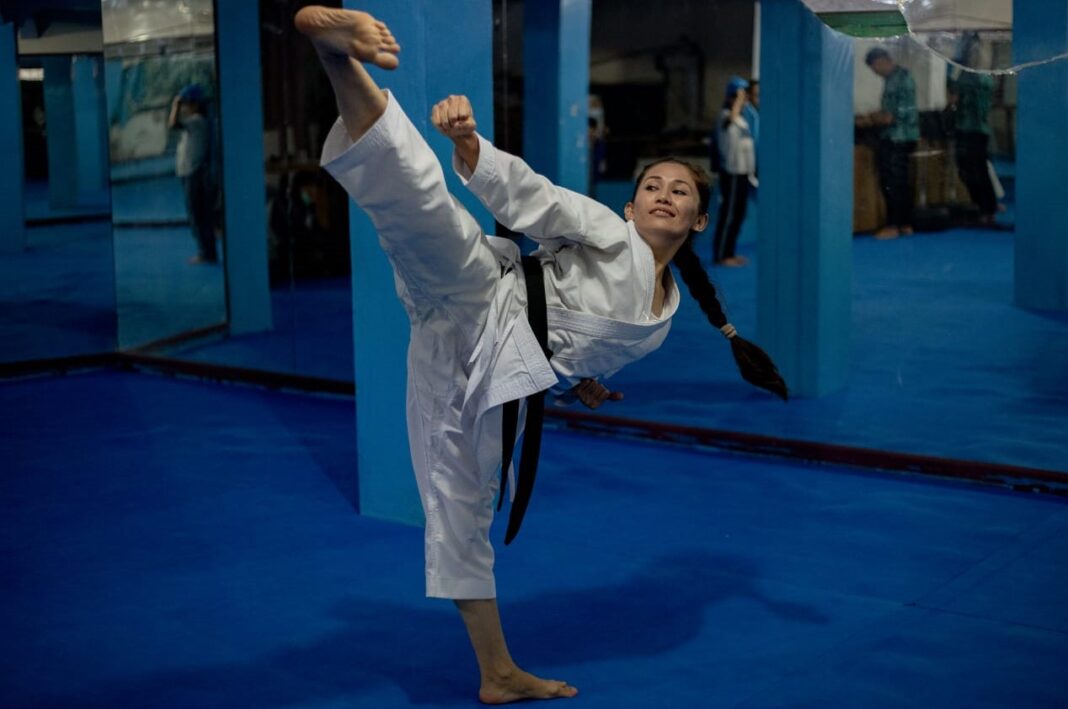JAKARTA: Meena Asadi fought against all odds to chase her dreams of being a professional karate athlete.
She was 13 years old and living in a refugee camp in Pakistan when she first decided to learn the martial art. After fleeing violence in Afghanistan with her family, Asadi was driven to break gender barriers in sports.
“When I saw boys playing sports freely, I asked myself: ‘Why couldn’t I do that?'” Asadi told Arab News in an interview. “It motivated me to start karate professionally.”
Asadi’s passion for karate has guided her life journey since, even over a decade later in Cisarua, a West Java town south of Jakarta, where she now teaches the art to fellow refugees.
Asadi returned to Afghanistan in 2011 but had to leave the country again due to violence and war. She arrived in Indonesia in 2015, where she has lived for years under increasing uncertainties over the future.
“In Indonesia, refugees live without even the most basic human rights. We consider ourselves forgotten,” Asadi said. “We all suffer from depression and psychological damage.”
Indonesia, which is not a signatory to the 1951 UN Refugee Convention and mainly serves as a transit country, is host to more than 13,000 refugees, many of whom have languished in the archipelago nation for years as they await resettlement in a third country.
As refugees in the Southeast Asian country find themselves further trapped in uncertainties, without the right to work and with only limited access to education, Asadi has been using karate to help them reduce their anxiety and find hope.
“Karate helps them to be physically and mentally strong. When they wear a karate uniform, they forget that they are homeless,” she said.
“This is how their stress decreases and they become hopeful.”
Asadi, who is a black belt in karate, won three silver medals at the 2010 South Asian Games.
She started the Cisarua Refugee Shotokan Karate Club in 2016 and now trains 40 students three times a week for two hours per session. Her youngest student is 7 years old, while her oldest is in his 50s. They are refugees from Iran, Iraq, Pakistan, Afghanistan and Sudan. More than half are girls.
The club in Indonesia, which the 29-year-old sustains with the help of local and foreign donations, was not her first, as she had started one back in Afghanistan not long after she returned to Kabul as an adult.
“You can just imagine being the one girl who is a karate coach in Afghanistan; people don’t want you to do sports,” she said.
“If a girl opens a karate club for boys and girls, she will find many enemies, which is something I was faced with. That is why I escaped and came here — to save my life.”
Throughout her life, Asadi has faced many barriers in pursuing her karate dreams, from family members who did not believe in her to the persistent violence in her home country.
Though she is thankful for the hospitality she has received from Indonesia, Asadi said that refugees in the transit country are akin to prisoners.
“We are prisoners here. Our crime is that we escaped from violence and survived. We have been living without basic human rights for years,” Asadi said.
As the world commemorates World Refugee Day on Monday, Asadi hopes that resettlement is in the near future for herself and her community.
“The world must open its doors to the refugees trapped in Indonesia,” she said. “They should be resettled as soon as possible because refugees are talented and skilled people.”




